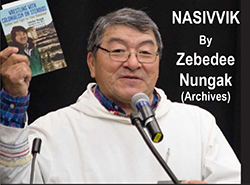
We should be deliberately determined to enjoy an anxiety-free, uncluttered, good, joyful and blessed Christmas season! No man-made occasion can draw us together like a real Merry Christmas
By Zebedee Nungak, columnist
Windspeaker.com archives, 2005
In the days before the pace of Arctic life quickened beyond all control, the Christmas season in Inuit communities was very short, very specific, and intensely memorable.
This was an age when the passage of time seemed to be less hurried; not harassed by computers, Internet, e-mail, microwavable instant food, or remote-manipulating dozens of channels on cable TV.
Back then, the lack of material possessions in the communities and among the people was not in any way a hindrance to the celebration of Christmas. It was a blessing uncluttered by "stuff," of which there is so much today!
A defining memory of the season in that past age is of genuine, spontaneous, unregimented JOY! Quviasuvvik, The Happy Time, was an occasion when the people and the community were uniquely One.
The atmosphere at the midnight church service on Christmas Eve was filled with a solemn joy shared by all the people, young and old, Inuk and Qallunaaq (white people). Absolutely everybody came to this event.
Children behaved properly, sitting quietly beside their parents. Kids dozed off to sleep on their mothers' backs, or on the floor. In the religious celebration, people's hearts seemed to beat close to that event 2,000 years ago, which was the cause of it all.
The Qallunaat living in Inuit settlements were generally fur traders, missionaries or policemen. They would lay out a feast of beans, biscuits and tea, a royal feed good enough eaten once a year by the people then.
The lack of variety in the menu of the Christmas feast never mattered. People old enough to remember bean feasts speak of them with nostalgia more affectionate than they express for today's great spreads of every imaginable food.
One of the main events was the dog team race, where the racers jockeyed to demonstrate their prowess as dog team handlers in a celebratory setting. Of course, the 100-pound sack of flour offered as first prize added to the competitive spirit, although this was not the sole incentive. The name of the winner of the race would be known, and talked about, far and wide, that year. A positively enhanced reputation was no less valued than the bag of flour.
Then there were the running races, the tugs of war, races under the seal net, and joyous scrambles for then-rare sweets and candy. At the dances, most participants wore sealskin kamiks, and the button accordion was played without amplification.
Whoops of joy were spontaneously expressed here and there as many otherwise normal and respectable people pleasantly surprised others by demonstrating some inimitable jerks and fancies in dance. After the celebrations were over, Inuit would travel back to their various traditional living areas, and immediately continue to eke out a living from the land and sea.
There was no room in life then for any lingering celebrations. Nowadays, Christmas season celebrations take up a jam-packed period of 10 days or more. Furthermore, this period is preceded by a long lead-in time stretched beyond the bounds of healthy, eager expectation.
Since the quickening of the rhythms of life, modern distractions seem determined to dilute the joy of Christmas Day. These days, stores start to display Christmas season things sometime in November. Christmas music is everywhere for a full month before the Day itself.
The "commercialization" jingles of Christmas are unavoidably evident for so long before the Day itself, it's a wonder collective "Christmas Fatigue" does not creep in. All this can be described as a "Christmassy too soon" whirlwind.
The Arctic has not been spared of it. Not having enough money is now a standard item of anxiety way before Christmas. This anxiety is totally foreign to Inuit regard of Christmas, and is one of the symptoms of having been nominally "civilized".
Back then, money was practically unheard of, and prizes awarded in races and contests were likely to be something to eat, something to wear, or something to smoke. Now, prizes are either money or expensive trinkets; certainly not useless, but maybe not as appreciated.
Various local organizations stir themselves awake and get into a fundraising mode. Christmas parties and dinners hosted by various agencies two weeks before Dec. 25 are now standard. There are now literally dozens of these. Even small villages nowadays have to formulate a schedule for that 10- or 12-day block of time that defines the season. Previously, community dances at Christmas were ones among many held throughout the year. Now, Christmas season dances are almost the only dances of the whole year!
Still, we should be deliberately determined to enjoy an anxiety-free, uncluttered, good joyful and blessed Christmas season! No man-made occasion can draw us together like a real Merry Christmas!
